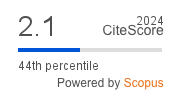A Vision on Intelligent Medical Service for Emergency on 5G and 6G Communication Era
DOI:
https://doi.org/10.4108/eai.17-8-2020.166293Keywords:
Emergency Service, Healthcare, 5G Communications, 6G Communications, Wireless Communications, Internet of Things, Internet of Everything, Vehicular Technology, Drones, Mobile Hospital, Hospital-to-Home Services, Fire Control, Accidental Services, Natural DisasterAbstract
Emergency service is the most important research field for welfare of human kind. Some examples are ambulances and fire control truck. However, these conventional emergency services are not equipped with appropriate equipment to provide high QoS. For instance, conventional medical emergency services include ambulances with drivers and oxygen supplies only. Another example is the conventional fire control systems that only include fire control truck, which is not suitable for current scenario due to various challenges, for instance, road traffic. In addition, accidental services are unsatisfactory in current and future emergency services. Emergency service is required by anyone at anytime and anywhere. Therefore, it is the time to redefine and restructure the conventional emergency service for saving more lives. Due to the advent of wireless communication technology, it is possible to provide the emergency service on the spot in nearly real-time to save lives. Moreover, integration of Artificial Intelligence with smart devices can change the definition of emergency services. In this chapter, we envision the various emergency services to advance the healthcare services. Besides, we envision the impact of emergency services on healthcare with the help of Artificial Intelligence, 5G and 6G communication technology.
Downloads
References
Downloads
Published
Issue
Section
License
Copyright (c) 2020 EAI Endorsed Transactions on Internet of Things

This work is licensed under a Creative Commons Attribution 3.0 Unported License.
This is an open-access article distributed under the terms of the Creative Commons Attribution CC BY 4.0 license, which permits unlimited use, distribution, and reproduction in any medium so long as the original work is properly cited.




